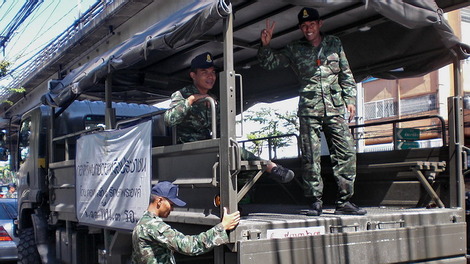For the past few decades, Thailand’s army has had a poor reputation.
Responsible for 18 military coups, the last one in 2006, and known by Thais as the ones actually running the country and not whoever is prime minister at the time, the 2011 floods in Thailand changed all that. Suddenly Thailand’s soldiers are heroes, and it is all because of the water.
The first time we heard about the Thai army working in flood prevention and relief was the day floods began to inundate Nonthaburi, a district on the border of Bangkok a few miles north from where we live.
Dramatic photographs were published in the Bangkok Post of Thai soldiers standing waist-deep in water, stacking sandbags in an attempt to save a local market from flooding. But even the Thai military couldn’t win against millions of cubic feet of water, and the market and all of Nonthaburi eventually flooded.
But, that didn’t stop them. In the following days, more photos of Thai soldiers, now in Bangkok itself, appeared in newspapers and on TV. Soon, 55,000 soldiers were deployed, along with 5,000 army trucks and 3,000 boats.
As area after area of Bangkok began to flood, the soldiers moved in. They stacked sandbags, stood waist-deep in water for hours directing traffic, carried elderly people through flooded housing estates, and drove trucks to taxi others through rising waters.
In our neighborhood, the army arrived two days before our street flooded. On that day, the major intersection near our house had water pouring in from three directions and was soon thigh-high under floods. The army erected barrels with a wooden platform built on top of them.
As the water rose, the barrels floated and, even at three feet deep, people could still stand on the platform and stay dry. Then the army trucks arrived.
As our street and the main street next to it were inundated with two feet of water, army trucks drove from dry land, through the flooded streets, and picked up anyone that flagged them down. All for free, running backwards and forwards, all day and on into the evening.
At rush hour, as people went to and from work, lines to get on an army truck went round the block, even as soldiers crammed 60 people on a truck and waved it off into floods as far as the eye could see. Trucks kept coming, but so did the people.
On one Sunday, we took an army truck from the closest dry land four miles to the intersection near our apartment. Getting off the truck, I slipped on algae-slimed pavement and, if it wasn’t for the two soldiers who grabbed me, I would have ended up face first in three feet of filthy flood water.
Some of the soldiers worked 14-hour days. They carried children, waded through stinking water pulling boats full of emergency food to deliver to people stranded in their homes, stood in water-logged intersections so that, when you got off the army trucks, they could help you onto less-flooded sidewalks before you got swept away by the current (and yes, the current was so strong, people were).
For all of this, the average Thai soldier made less than 350 baht ($11.70) a day.
Now, as the floods are finally receding, Thailand’s military are heroes. Ordinary Thais, who wouldn’t normally give them the time of day, are taking them food, buying them drinks, throwing parties for whole military companies — showing their gratitude that these soldiers, many not much older than boys, were willing to work so hard to help their fellow citizens, and their country, during one of Thailand’s most devastating events.
Whether the Thai army’s new status as heroes will last, however, is anyone’s guess.
Their history is not a good one. Then, when you factor in all the military coups, it is not surprising some Thais feel the “hero worship” may be temporary. After all, it is hard to trust an entity that has taken over the government 18 times already.
But, maybe it is a new time for Thailand’s army. A time of being heroes, and being appreciated. Time alone, of course, will tell.

